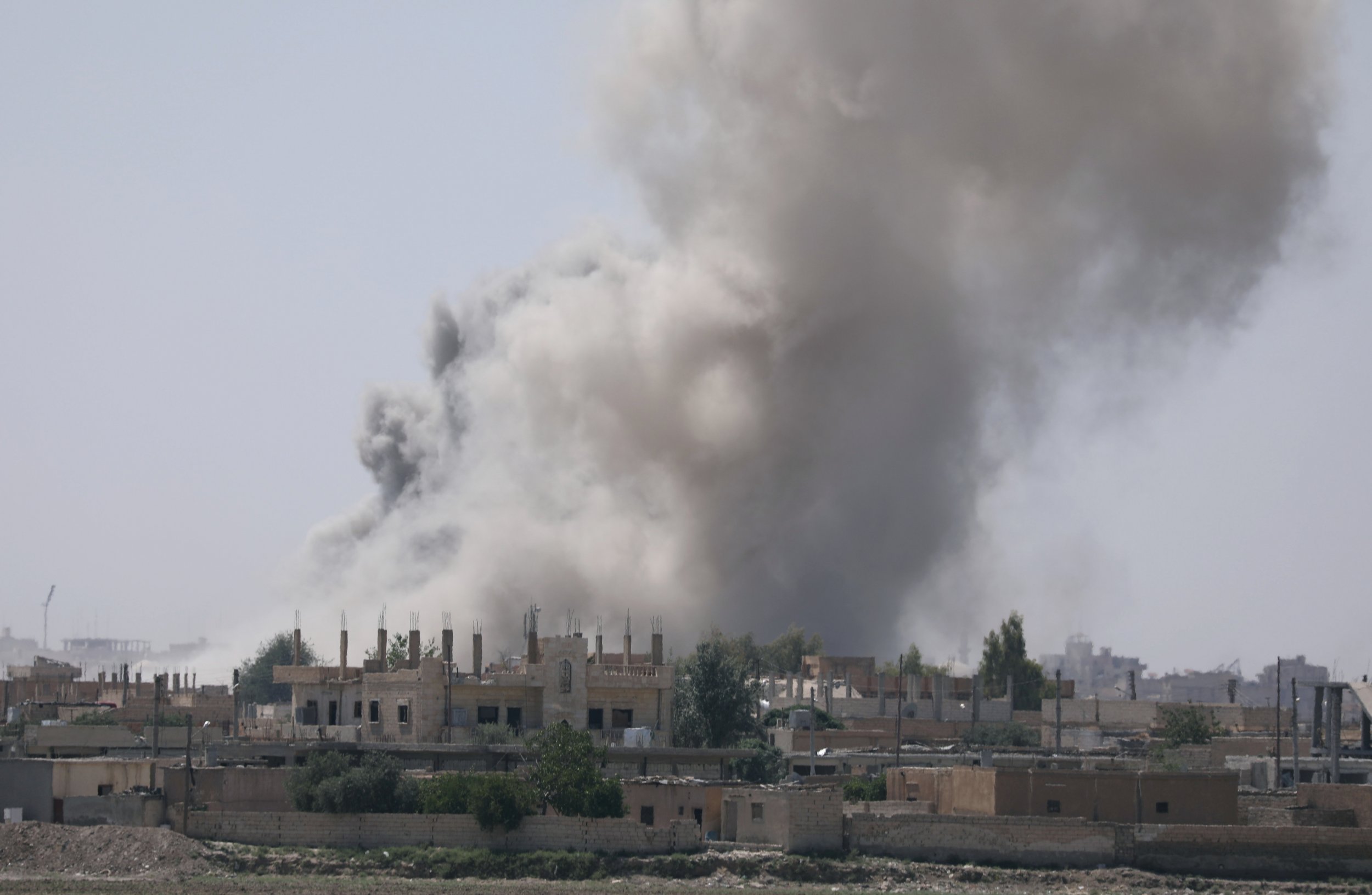
Syrian forces backed by the U.S. have taken their first neighborhood in a city considered to be the de facto capital of the Islamic State militant group (ISIS).
The Syrian Democratic Forces (SDF), a majority-Kurd coalition of Arabs and ethnic minorities, has become the U.S.'s main Syrian partner in the fight against ISIS. In what has been called the latest and final phase of the SDF's assault on Raqqa, the headquarters of ISIS's self-proclaimed caliphate, the SDF on Friday cleared fighters loyal to the hard-line Sunni Muslim group from the city's al-Mishlab neighborhood, making use of heavy air support from a U.S.-led international coalition. The news was initially reported by Hawar News Agency (ANHA), a Kurdish outlet based in the Syrian city of Hasaka, and later confirmed by NRT, another Kurdish news station based in Sulaimaniya, Iraq.
Related: Syrian forces threaten to fight back after U.S. military strikes multiple times
"After brief clashes, the terrorists evacuated the neighborhood. We are now in control of al-Mishlab in a first progress within the battle for Raqqa city," SDF officer Habun Osman said Friday to the Syrian Kurdish outlet ARA News, which is supported by Dutch NGO Free Press Unlimited.
ANHA says the 'first neighbourhood' is liberated in #Raqqa. I think they are talking about al-Mishlab #SDF pic.twitter.com/rqUDIVH9S4
— Wladimir (@vvanwilgenburg) June 9, 2017
The SDF campaign to dislodge ISIS from Raqqa, dubbed Operation Euphrates Wrath, was first announced in November. The first phase of the battle was intended to sever the city's northern routes. In December, the SDF announced it had moved on to the second phase: capturing ISIS-held villages in Raqqa's western countryside. In the third phase, announced early this year, the SDF began an advance to secure the eastern, rural stretches of Raqqa. The offensive was briefly stalled during its fourth phase due to a prolonged battle for the town of Tabqa and the nearby dam named after it, but eventually moved on to the fifth and final phase, announced Tuesday—a direct assault on Raqqa city itself, according to Reuters.
The SDF has since witnessed steady victories on the city's eastern and western flanks, especially after receiving heavy weapons directly from the U.S. Following the SDF's taking of al-Mishlab, in the east, other SDF forces were pictured lowering ISIS flags in the village of Jazrah, located in Raqqa's western suburbs. The SDF has also reportedly moved into the western Raqqa neigborhood of Sabahiya. As the U.S.-backed forces pierce the ISIS heartland, however, other factions are contending for influence over the nation that has been at war for over six years.

In the far western stretches of the Raqqa governorate, the Syrian military and its allies, which include Russia, Iran and various militias supportive of Syrian President Bashar al-Assad, have also made steady gains against ISIS. The SDF and the Syrian army have both fought and assisted one another at times but have no formal relationship. While both forces reject the fundamentalist religious views of ISIS, Al-Qaeda and other jihadist groups, as well as Turkish intervention, the U.S.'s growing hostility toward Iran-backed forces in the region has resulted in U.S. airstrikes against pro-Syrian government forces elsewhere in the country, and has the potential to cause further friction in northern Syria.
Late last year, the Syrian military and Kurds were mostly allied during the government recapture of Aleppo from insurgent groups, largely seen as a turning point in the conflict. Many Syrian opposition groups have received assistance from Turkey, which has labeled certain SDF-affiliated Kurdish militant groups, such as the People's Protection Units (YPG), as terrorist organizations due to their alleged connections to Kurdish nationalist groups involved in a decades-long insurgency in Turkey. Ankara has repeatedly warned the U.S. to downplay the role of such Kurdish groups in the region, but these calls have largely fallen on deaf ears in Washington.
Uncommon Knowledge
Newsweek is committed to challenging conventional wisdom and finding connections in the search for common ground.
Newsweek is committed to challenging conventional wisdom and finding connections in the search for common ground.
About the writer
Based in his hometown of Staten Island, New York City, Tom O'Connor is an award-winning Senior Writer of Foreign Policy ... Read more
To read how Newsweek uses AI as a newsroom tool, Click here.





